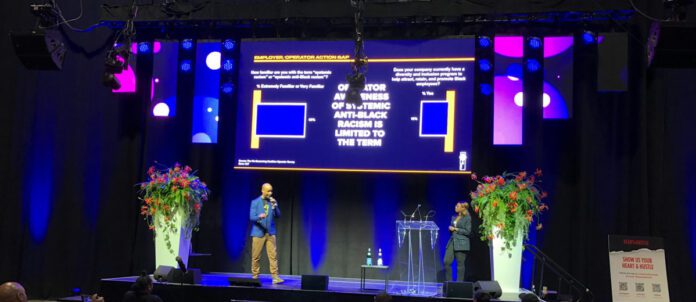TORONTO — The Restaurants Canada Show (RC Show) returned to Toronto’s Enercare Centre April 10 to 12 for three days of panel discussions, workshops, competitions and networking opportunities for the foodservice industry.
A panel titled Listen & Learn: Indigenous Leadership Panel addressed how the hospitality industry at large can learn from Indigenous professionals, culinary techniques and ways of working. Moderated by Jenni Lessard, executive director, ICAN, the panel looked at how the industry can engage and support Indigenous ideas and talent and increase access for Indigenous entrepreneurs, while enriching the Indigenous consumer experience.
Speakers included Tawnya Brant, chef/owner, Yawékon Foods; Scott Iserhoff, owner, Pei Pei Chei Ow; and Inez Cook, owner, Salmon n’ Bannock Bistro.
The discussion began with the topic of what food sovereignty means to the chefs.
“Indigenous food sovereignty is going to be different from person to person just because they grew up differently,” said Iserhoff, who creates dishes from his childhood, but with his own unique perspective. “They have different stories they were told by family. When I re-create something in a conventional kitchen, I find it difficult to connect because my memories of food involve the smell of smoke. So just make my own [smoking] rig with a chafing dish so I can get that little bit of smoke.”
He says food is like a powerful medicine that takes him back in time, “to sitting around that fire, eating a meal that you grandfather, or your grandmother made.”
As a restaurant owner, Cook said food sovereignty is a very big issue right now, “as we have to use all commercially supplied ingredients. And, of course we understand for food safety, everything needs to be commercially supplied. However, I like to bring up this idea of perspectives. If you were the only French restaurant in Paris, and you were told you weren’t allowed to serve your foods, what do you think would happen? Or if you’re in Tokyo, Japan, and you had the only Japanese restaurant in Tokyo, and you were told you were not allowed to serve your foods, people would go nuts. But being the only Indigenous restaurant in Vancouver, and I tell people, I’m not allowed to serve my Indigenous foods, do you know what people say? ‘Oh, that sucks.’ We need to do better. And now there’s a lot more attention to this and hopefully now we can start working towards doing better.”
The Future Is Now
We all know that the pace of tech is accelerating, and restaurants are in the thick of it. In the session titled The Future Is Now. Are You Ready? Executive Technology Panel, panellists talked about the promise and business potential of new restaurant-management technologies, the future of takeout and delivery, guest experience, and AI and automation for the industry.
Moderated by Wilkin Hsien, director, Enterprise Technology & Data, Restaurants Canada, panellists included Julie Denton, CPO, Recipe Unlimited; Nav Sangha, founder & CEO, Ambassador; and Bethany Zak, general manager, back of house/director of Internal Innovation, Relish Works.
“The pandemic changed the way independent restaurants look at technology,” said Sangha to kick things off. “Prior to the pandemic, you would question — even as the pandemic was unraveling — why so many full-service restaurants were struggling and scrambling to find solutions to sell online. It really seemed like they were unprepared. It wasn’t necessarily that they weren’t open to adopting technology, it just wasn’t a priority because they were so busy with full-service, in-restaurant, dining and everything else.”
He said through the pandemic, these operators had the luxury of time to learn, explore and adopt new technologies more than ever before. “And all the platforms have accelerated and expanded upon the restaurant tech stack, as well. Alongside all that, for the first time, it’s really clicked for restaurant operators how important their customer data is. And they’re actually using it, they’re seeking to use it. Whereas it might have been overlooked in the past by a lot of independent restaurants.”
For Denton, looking at the breadth of the concepts Recipe Unlimited has in its portfolio, “in the front of house, new technology, whether that was kiosks or online ordering, tablets at the table side, or pay at the table, et cetera, the variety of uses of technology throughout the ecosystem is here to stay. Now we need to find the right balance, and really drive more guests into our dining rooms.”
For the independent operators, she offered the following advice. “You really need to be clear on what is your concept, what is your value proposition to guests, and make sure that the technology is an enabler to that and not a distraction. We saw a lot of emphasis on, for example, pay at the table, but I’m not sure that all of our customers necessarily want that. They want to have that interaction with the server, they want that extra touch point, you want to make sure that they’ve had a great guest experience, and that they leave happy.”
Sommelier Service Competition
The Ontario chapter of the Canadian Association of Professional Sommeliers (CAPS) held its third annual Sommelier Service Competition at the Bar & Beverage Stage at the 2023 RC Show.
Justin Madol, sommelier at Michelin-starred Don Alfonso 1890 Toronto finished first; Nathan Hooper, head sommelier at Don Alfonso 1890 Toronto finished second; Christian Hamel of Toronto’s Pompette restaurant finished third; Christophe Reitz of Quatrefoil Restaurant in Dundas, Ont. finished fourth; and Jeffrey Roel of Toronto’s Vela finished fifth. The grand prize was an all-expenses paid luxury trip to Champagne, France, courtesy of sponsor Piper-Heidsieck.
Following a preliminary written exam held last month, the provincial finalists competed live on stage and were judged on both wine and spirits service and knowledge by top Canadian wine professionals, including James Treadwell, José Luis Fernandez and Nabilah Rawji.
“The five talented competitors represented the very best in the province, and in an exciting and close competition, Justin came out ahead to win the grand prize,” said James Peden, president, CAPS Ontario. “We applaud the CAPS Ontario Board, the event team and all competitors on another successful hospitality event and congratulate Justin and wish him well on his upcoming trip to Champagne.”
“I’m very grateful to have won at CAPS’ Sommelier Service Competition, given all the finalists being such tremendous sommeliers, said Madol. “I’ve been working hard these past three years, both in elevating my service at Don Alfonso 1890 and in preparing for my Master Sommelier diploma, so it’s rewarding to see my effort making a difference. It’s a huge boost professionally to be recognized by CAPS and the community in this way.”
The award follows Madol’s recent win of CAPS Ontario’s 2022 Best Ontario Sommelier Competition (BOSC) held late last year at the Liberty Grand in Toronto.
The Black Experience in Foodservice: How Companies Can Do Better & Sell More
Back at the Speaker Stage, Philman George (corporate chef for High Liner Foods) and Elle Asiedu, co-founders of The Re-Seasoning Coalition, a non-profit organization dedicated to increasing the representation of Black Canadians in foodservice through research, programming and community, presented an insightful session that offered organizations an opportunity to consider how they can become more equitable for a stronger bottom line.
“For the last 10 years, I’ve been the corporate chef for High Liner Foods. I’ve got this privileged bird’s eye view of the entire industry, which is something that people with my skin colour don’t usually get,” said George. “In the last 10 years, I’ve noticed something…the higher up you get on the ladder in terms of decision makers, the less of me you see. I like to coin it as, we see a lot of salt, but not a lot of pepper. This is the crux of The Re-Seasoning Coalition.”
George continued, “When Elle and I formed The Re-Seasoning Coalition, we started by looking for the research, and what we found is the research doesn’t exist. Canada does a horrible job of collecting race-based data. As an industry, we’re in our infancy with collecting this data. Our friends in the U.S., however, have been collecting race-based data for decades and can make some informed decisions.”
Chicago-based Technomic, Inc. became The Re-Seasoning Coalition’s research partner. George said the methodology is sound with 1,000 people surveyed across Canada with different ethnicities and age groups, which they overlaid with a sample of Black Canadians to compare the national average. With the help of Restaurants Canada, The Re-Seasoning Coalition was also able to interview operators to gain their perspective on DE&I. After compiling their data, the Lighting the Fire: Understanding Racial Inequalities in the Canadian Foodservice Industry report was published to offer three perspectives: the operator, the employee and the consumer.
Asiedu said, “Canada has the most ethnically diverse population that’s Black or can trace their ancestry to African people outside of Africa. That points to the fact that Canada continues to be a place to call home. It’s no surprise then that in the next 15 years, our racialized population is going to explode, reaching about 40 per cent in the nation’s most populous cities. Are you and organizations prepared to recruit, retain and support the employees of the future?”
She went on to say that by 2035-2036, racialized communities will make up almost half of the potential employee pool that an organization will derive from, reinforcing the importance of implementing an equitable approach to diversity today. Generationally, the Millennial and Gen Z cohorts have the strongest views on DE&I.
Key findings from the report include:
- Overall, 67 per cent of Canadian operators believe that diversity and inclusion is a very important or important priority area for their businesses. Only seven per cent believe that the topic is not important.
- While 48 per cent of overall Canadian consumers say it’s important or very important for restaurants and food-delivery apps to prioritize DE&I practices, 58 per cent of Canadians aged 18-34 state the same.
- Despite believing DE&I are priority areas, 71 per cent of Canadian operators surveyed don’t currently have a diversity-and-inclusion program in place to help attract, retain and promote Black employees.
- More than 40 per cent of those operators who have implemented DE&I programs in their organizations have not communicated the policies to their employees.
- Nearly half of senior managers, restaurant managers and hourly employees in both chain and independent restaurants have yet to receive any form of diversity training.
- Overall, 50 percent of Black employees say they have experienced or witnessed racial discrimination, compared to 29 per cent employees of other races. Additionally, 37 per cent of Black employees believe they have been denied employment or advancement because of their race, compared to 18 per cent of other employees.
To access the full report, click here.
Growth Series: Black Excellence in Foodservice – Turning Passion into Performance
Shortly after, Elle Asiedu, co-founder of the The Re-Seasoning Coalition, moderated a panel discussion about Canada’s food industry through the eyes of four Black entrepreneurs who have staked their claim in the industry despite the odds against them. Speakers included Janice Bartley, founder and executive director of Foodpreneur Lab; Sasilka Shallangwa, CEO of SKCOOKKS; Ryan Hinkson, content creator, @EatFamous; and Brian Butler, owner, Dirty Bird. Together, the panellists shared their advice for business owners of all sizes looking to achieve their goals.
The conversion began with the panellists identifying aspects of their upbringing, background and hobbies that played a pivotal role in where they are now. Together, the panellists highlighted heritage, manners and a desire to do something different as some of those key aspects.
“I’m tone deaf to the word ‘no.’ I have heard it so many times, and I’m grateful that I’ve become tone deaf to it or else I couldn’t be sitting here doing what I do today,” said Bartley. “I don’t seek validation from others, I know my value. That is something that as entrepreneurs and as a community we have to really lean into. Because opportunities don’t come up for us doesn’t mean we don’t carry value in what we do. What I’ve learned in the 30-plus years of entrepreneurship is you only have your integrity, and if you lose that, you have nothing.”
In a similar vein, the panellists also discussed what keeps them motivated through difficult times. “My wife, my children, my family. I want to make my kids proud because I didn’t have those types of role models growing up,” said Butler, adding that his mother struggled with substance abuse when he was a child and spending majority of his teenage years in foster care.
Hinkson agreed. “My family, my daughter…and bills,” he chuckled. “Truthfully, when I started I experienced imposter syndrome because a lot of my peers didn’t look like me, I didn’t have a social-media background and I wasn’t the best photographer. I never put my face on the account when I was starting out, it was just food. Reels and videos weren’t as popular then as they are now. Eventually, as food blogging took off and all the content was looking the same, I decided to focus the camera on myself. Somebody sent me a message and said, ‘I didn’t know you were Black and I cried when I saw your face.’ That shook me. So many young Black people have reached out saying they started their own accounts because of me, and that’s a big motivational piece for me.”
“I came here as an immigrant from Nigeria over a decade ago and we’ve seen is an influx of immigrants over the past two decades, specifically Nigerian children who have come here to look for a new future because our system just doesn’t work. We’ve seen other African restaurants open and we’ve seen these children become layers and doctors…so many great things. That keeps me going,” said Shallangwa.
To wrap up the panel, the speakers offered their advice to restaurateurs who are thinking about introducing their native foods to communities that are very different from the products’ origin.
“There are five things that I check on every day,” said Shallangwa. “First, educate your customers because you’re selling something different. People want value for money. Second, stay authentic and true to your flavours. Third, offer familiar options because you don’t want to scare customers off. Everyone here has tried a beef patty, for example. Fourth, make sure you have an experience that you’re selling in regard to your dining space. Our space transports you to Nigeria through flavours, music, murals, etc. Lastly, you have to be passionate and motivate yourself with the progress you’ve made every day.”
Breakfast with Champions
On the final day, hospitality industry leaders gathered at the Liberty Grand Entertainment Complex for Restaurants Canada’s Breakfast with Champions event to gain data-driven insights, the latest trends and exclusive knowledge from innovators and leading speakers.
Hosted by Manjit Minhas, co-owner and founder of Minhas Breweries, Distilleries and Wineries and Dragon Investor on Dragon’s Den, the event began with opening remarks from Christian Buhagiar, president and CEO, Restaurants Canada, followed by an opening ceremony led by Kim Wheatley, Anishinaabe Cultural Consultant.
“When I joined the association less than two years ago, it was because I valued and respected the grit and tenacity of this industry, and I wanted to contribute to its transformation and its success,” said Buhagiar. “Walking the show floor this week and speaking with so many of you has reinforced the importance of the work we do at Restaurants Canada and the need for all of us to be unapologetic champions of our industry. It has also showed me that now, more than ever, we’re stronger together and stronger with a unified voice.”
The event continued with an economic forecast and trend analysis, presented by Vince Sgabellone, foodservice industry analyst at Circana, and Chris Elliot, chief economist and VP of Research at Restaurants Canada.
“The foodservice industry is so much different than what it was in the past, and we have a lot of challenges still ahead,” said Elliott. “Our goal is to provide the insights, analysis and data that you need to help form and build your businesses in the years to come.”
Because consumers have been eager to return to restaurants, the industry reached $100 billion in annual sales in 2022. “While it’s a milestone, when we factor out inflation and population growth, commercial foodservice sales have been down for 35 consecutive months,” said Elliott. “This aligns with [Restaurants Canada’s] latest survey. Only one-third of foodservice operators said that their sales were higher in the Q1 2023 compared to Q1 2019, and 45 per cent have lower sales because the pre-pandemic foot traffic hasn’t returned. Overall, eight out of 10 operators have lower profitability today than what they did pre-pandemic.”
Turning to the consumer perspective, Sgabellone said, “The work-from-home and hybrid-work models have impacted the foodservice industry to the tune of about 100 million missing visits a year, so the industry is looking to close up that deficit. This has mostly impacted the lunch daypart, which is still down versus historical levels. But, one thing that has happened during this time is consumers have switched their foodservice spending budget and are now spending more on dinner, especially with their families.”
Additionally, the last year has seen an uptick in on-premise visits. There has been 75-per-cent growth in QSRs and 68-per-cent growth in FSRs, according to Sgabellone.
Looking to the future, Sgabellone and Elliott shared four recommendations for success in 2023: focus on growth channels (morning meal, dinner, Gen Z and higher-income households); establish emotional connections to food; invest in digital in any/all its forms; and re-purpose existing space (community events, remote workspaces and rationalize menus).
Next up was a leadership panel featuring Kate Longmire, VP Foodservice Marketing & Innovation, Maple Leaf Foods; Julie Denton, CPO, Recipe Unlimited; and Juanita Dickson, president of Gusto 54 Restaurant Group. The discussion, moderated by Trevor Lui, co-founder of Quell Now Inc. and Highbell Group, offered stories of conscious innovation and the role emerging leaders and big ideas play in the future of hospitality and foodservice.
Denton said Recipe’s focus has been bringing a career back into the industry through benefits, training and mentorship programs. In fact, the company launched Recipe University, which is both a digital and in-person training program with roughly 63 courses to teach people about the guest experience, health and safety, innovation and more.
“We don’t want it to just be your first stop and then you’re onto something else,” said Denton. “The thing that matters most to us is how we bring stickiness to this industry and really show people you can have a career here. You may start as a garnisher at Harvey’s but we want you to become a general manager at the Landing. We make sure we have a value proposition to our teammates, and that we hire the best. I know that sounds harsh when there’s a talent shortage, but we still need to hire for fit. We need to find people that have the hospitality gene and show them how they can build a phenomenal career.”
Dickson said Gusto’s path is similar. “I also feel that we’re now ready for anything,” she said. “We just survived a global pandemic as an industry, so bring it on because we’re going to make it work. Rising food costs, labour shortages – it’s tenacity that gets me up in the morning. Nothing is going to push us down anymore.”
“Our resiliency has created a new type of passion,” said Longmire. “It’s passion to try and figure out what we can do in our small part to help, which spurs a different level of creativity across the industry. Instead of doing traditional B2B marketing and selling our own products, we pivoted and decided we would promote to consumers on behalf of our customers, and use our follower base as a platform for our customers to advertise. We also dug deep on our sustainability platform, which is the underpinning of all we do at Maple Leaf. When you root yourselves in something that truly matters and makes a difference, it doesn’t matter what comes at you.”
Then, Renée Suen, restaurant and travel writer and blogTO food editor, moderated a discussion with Will Guidara, founder of Make It Nice Hospitality Group, about his new book, Unreasonable Hospitality, and why it’s important to create a hospitality-first culture and see it through.
As mentioned in his book, Guidara recounted the time when New York’s Eleven Madison Park first appeared in The World’s 50 Best Restaurants in 2010 and climbed the ranks to No. 1 in 2017. As co-owner, Guidara was a key architect of the restaurant’s success. He went on to share lessons on how the art of hospitality can retain great talent, attract new talent and bring back raving customers to increase profit margins.
“Athletes always go to the tapes when they’ve had a bad game to see what they could have done better. Collectively, we don’t go to the tapes often enough when we’ve had a good game to see what we did well and to make sure we keep doing those things. That’s how you put intention to intuition and systemize moments of brilliance from the fabric of your company.”
Guidara said he noticed three things in his tapes: the importance of being present, the ability take what we do seriously without taking ourselves seriously; and the capacity to recognize diners as unique individuals instead of a commodity to make them feel seen.
Other speakers included Kris Hall, founder and CEO of The Burnt Chef Project, who shared front-line insights and tools to help leaders support their teams and eradicate mental-health stigma in the hospitality industry; Raia “Coach” Carey, who encouraged attendees to remember the space they hold within the hospitality industry and empowered leaders to heal, include and elevate talent to retain labour and build stronger teams; and Sam Kashani, country manager for Canadian operations at Too Good to Go, who spoke about why reducing food waste is the single most effective way to lower greenhouse-gas emissions.
The event concluded with an awards presentation. The RC Leadership Award was presented to Gregory Roberts, owner and CEO of Mary Brown’s Chicken; the RC Culinary Award was presented to chef Tre Sanderson, the first Black winner of Top Chef Canada season 10; the RC Emerging Leader Award was presented to Imrun Texeira, chef and owner of Wanderlust; the RC Social Advocate Award was presented to Sharon Hapton, founder and CEO of Soup Sisters; and the RC Legacy Award honoured Peter Oliver, co-founder of Oliver & Bonacini, who passed away on September 21, 2022. Peter’s eldest son, Andrew Oliver, president and CEO of Oliver & Bonacini, accepted the award.
Click here for more coverage of the 2023 RC Show


















